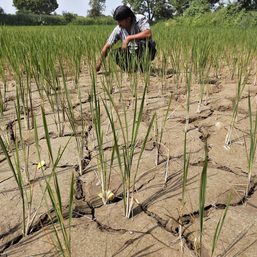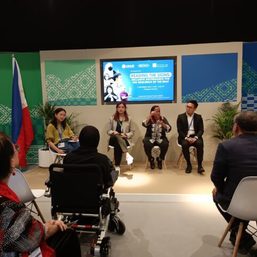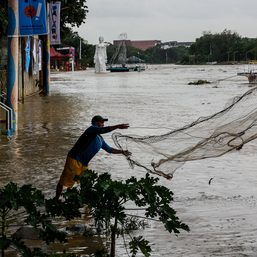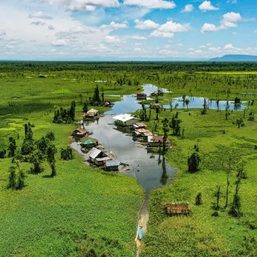SUMMARY
This is AI generated summarization, which may have errors. For context, always refer to the full article.
![[OPINION] COP26: No more time to lose](https://www.rappler.com/tachyon/2021/11/COP26-No-time-to-lose-November-6-2021.jpeg)
The Conference of Parties (COP) 26 in Glasgow was postponed in 2020 due to the COVID-19 pandemic, so this year’s COP will have to work doubly harder in order to meet the challenges posed by the climate crisis, especially in view of the Sixth Assessment Report released by the Intergovernmental Panel of Climate Change (IPCC) in 2021.
As a member of the Alliance for Climate Transformation 2025 (ACT2025) consortium, and in fact as part of a research institution, we at the Manila Observatory have been closely looking into developments leading up to the COP, and are looking forward to the decisions that will be made, which we hope will lead us closer to combat the climate emergency that we currently face.
What to expect in COP26
With most members having already communicated their Nationally Determined Contributions (NDCs) to the United Nations Framework Convention on Climate Change (UNFCCC), and with the latest Assessment Report released by the IPCC, there are a number of things that environmental organizations and individuals think should be discussed and brought to the forefront.
![[OPINION] COP26: No more time to lose](https://img.youtube.com/vi/C9XddNVZTg0/sddefault.jpg)
According to the IPCC report, many of the current changes observed in climate are unprecedented. Their press release, which was issued simultaneous with the report, provided that climate change is observed as already affecting every region on the earth, and that the role of human beings on the climate system is now undisputed. The report further stated that the temperature caps in the Paris Agreement (of 1.5 degrees Celsius and 2°C) will be exceeded unless deep reductions in carbon dioxide and other greenhouse gas emissions will occur in the coming decades.
It is imperative, therefore, that the science is made primary, and that discussions revolve around how best to combat the climate crisis, armed with the information that we have already known, but to which climate scientists have now sounded the alarm. It is important that the COP presidency continues to discuss issues that have been raised by many developing and vulnerable countries – particularly issues with regard to climate finance and climate justice.
Climate finance and climate justice are two of the main discussions that are expected to take place during the COP26, particularly in the lens of loss and damage. It is no secret that with the rise of the global temperatures, natural disasters have increased in frequency and intensity, including typhoons, wildfires, droughts, and floods. Food insecurity is also an alarming issue, as is the loss of ecosystems. Developing countries, while contributing the least greenhouse gas emissions globally, are unfortunately most prone to the harshest effects of climate-induced disasters.
It is with this context in mind that climate-vulnerable countries clamor for the establishment of loss and damage as a permanent fixture in the climate negotiations, starting with this COP. By doing so, those most vulnerable to climate-induced disasters are given the opportunity to raise their concerns, and solutions can be arrived at. Accessing funding for climate-induced loss and damage is also a key priority for this year’s COP.
This year, also expect that environmental groups and developing countries will step up calls for a stronger commitment from all countries – especially major emitters – for deep cuts in their emissions by 2030 so that the temperature cap in the Paris Agreement is met, and in the face of the currently available science. At this point in our climate journey, everyone should be much more aggressive in combating increasing global temperatures, but the responsibility falls heavier on the major emitters.
ACT2025: pressing forward
These are also things that our consortium, ACT2025, will want to see in the COP26. In our releases, an Alliance Statement, and our podcast series, we laid down the five areas which we believe are essential in rebuilding trust, fostering international cooperation, and reaching ambitious and just outcomes:
- Boosting climate ambition
- Finalizing the rules of the Paris Agreement
- Helping and ensuring that climate-vulnerable countries adapt
- Delivering essential climate finance
- Addressing loss and damage from most extreme climate impacts
As part of the consortium, we will also take part in hosting a side event during the COP. In the hybrid in-person and virtual side event, we will look at how the COP26 package can drive ambition and resilience with solidarity and justice, and it will be led by the directors of the consortium and ministers from vulnerable countries.
![[OPINION] COP26: No more time to lose](https://img.youtube.com/vi/qaKO1Vok8rk/sddefault.jpg)
Time is of the essence
It is believed that COP26 is the most important negotiation to take place since the 2015 Paris Agreement, and for good reason. Now that most parties have updated their Nationally Determined Contributions (NDCs) and following the report of the IPCC, what happens next is the question that is on everyone’s mind. How can we ensure progress on the Paris Agreement? Will countries resolve to strengthen their NDCs in order to align with the 1.5°C temperature goal? Will developed countries update their climate finance pledges? Is the creation of predictable finance for adaptation of developing countries possible? Will loss and damage become a permanent item? Will the common timeframes finally be agreed upon? How do we ensure that in the pursuance of our climate commitments, we continue to uphold justice and the protection of human rights?
There are so many questions, and as many uncertainties. However, one thing remains crystal clear: There is no more time to lose.
It is fundamental, therefore, that these questions and uncertainties are allayed in Glasgow. Time is of the essence. Countries need to fully commit to their climate goals, and even make it more ambitious; it is much more important to listen to – and amplify – the voices of the marginalized, who have bigger stakes in view of the climate crisis; human rights, and just transition should be at the forefront of climate policies that are to be drafted; everyone must come together – governments, civil society, the private sector – in order to ensure that we are able to combat the challenges brought about by an ever-increasingly warming world.
It is not yet too late, but we have to act now. Years from today, future generations will look at the Glasgow conference and think about whether countries chose to come together to combat the climate crisis, or refused to. It is our hope, therefore, that we make good, bold, and just choices next week as Glasgow concludes.
This is the only way we can create a climate-resilient and just future for all. – Rappler.com
Tony La Viña is Associate Director for climate policy and international relations of Manila Observatory (MO).
Joy Reyes and Yla Paras are affiliated with MO’s energy collaboratory. Reyes leads the MO delegation in Glasgow.
Voices features opinions from readers of all backgrounds, persuasions, and ages; analyses from advocacy leaders and subject matter experts; and reflections and editorials from Rappler staff.
You may submit pieces for review to opinion@rappler.com.
Add a comment
How does this make you feel?









There are no comments yet. Add your comment to start the conversation.